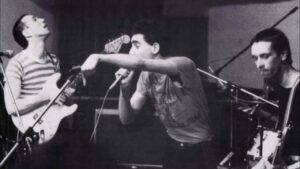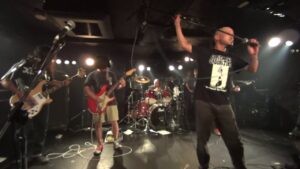Formation & Members
Anarchy (アナーキー) emerged from the vibrant punk scene of Japan in the late 1970s, a period marked by cultural upheaval and a growing appetite for rebellious music. The band was formed in 1978 in Kyoto, a city known for its rich cultural heritage, but also, at that time, for its burgeoning underground music scene. The original lineup consisted of passionate musicians who shared a love for punk’s raw energy and an eagerness to voice their dissent against societal norms.
The founding members were lead vocalist Koji Tano, known for his intense stage presence and provocative lyrics, guitarist Shinichi Nakayama, whose riffs combined aggression with melody, bassist Yasunobu Torii, who laid down the powerful foundation for their sound, drummer Masahiro Kitada, whose relentless beats drove their tracks, and rhythm guitarist Kazuo Takeda, who added depth to their music. This lineup remained consistent throughout their early years, establishing Anarchy as a formidable force in the Japanese punk scene.
Musical Style & Characteristics
Anarchy’s musical style is quintessentially punk, characterized by fast-paced rhythms, stripped-down instrumentation, and lyrics that confront societal issues head-on. The band drew inspiration from Western punk icons like The Clash and Sex Pistols, but infused their sound with a distinctly Japanese sensibility. Their music often features an aggressive tempo and powerful guitar riffs, coupled with Tano’s gritty vocal delivery, which conveys both fury and an urgent call for change.
Lyrically, Anarchy was unafraid to tackle controversial topics, addressing themes such as political corruption, social inequality, and the disillusionment of youth. Their songs serve as anthems of rebellion, resonating with fans who shared similar frustrations with the status quo. The band’s ability to blend catchy hooks with pointed commentary set them apart, making their music as thought-provoking as it was energizing.
Key Works & Discography
Anarchy’s discography is a testament to their prolific nature and enduring impact on the punk genre. Their debut album, “Anarchy,” released in 1980, was a critical and commercial success, solidifying their position in the Japanese music scene. The album features standout tracks like “No No Boy,” which critiques societal expectations, and “Tokyo Is Burning,” a fiery anthem about urban chaos.
Following their debut, Anarchy continued to release a string of influential records, including “Anarchy Live” (1981), which captured the raw energy of their performances, and “Shinjuku Junction” (1982), which showcased their evolving sound and lyrical depth. Over the years, the band experimented with different musical elements, incorporating elements of reggae and ska into their work, as heard on albums like “Anarchy in the Music” (1984).
The band’s discography is not only a chronicle of their musical journey but also a reflection of the socio-political landscape of Japan during their active years. Each release added a new layer to their legacy, ensuring that Anarchy remained relevant in an ever-changing music industry.
Influence on Other Bands/Scenes
Anarchy’s impact on the punk and hardcore scenes extends far beyond their music. As pioneers of the Japanese punk movement, they paved the way for countless bands that followed. Their unapologetic approach to music and activism inspired a generation of musicians who sought to challenge societal norms and express their individuality through art.
Their influence can be seen in the works of other notable Japanese punk bands like The Stalin and The Blue Hearts, both of whom have cited Anarchy as a major inspiration. Beyond Japan, Anarchy’s music found resonance with international audiences, contributing to the global punk movement and demonstrating the universal appeal of their message.
By integrating local experiences into a genre dominated by Western acts, Anarchy helped redefine what punk could be, encouraging artists worldwide to draw from their cultural backgrounds and personal experiences in their music.
Breakups or Reunions
Despite their success, Anarchy faced challenges that led to their eventual disbandment. Internal conflicts and the pressures of maintaining their rebellious image in a commercial industry took a toll on the band. In 1985, after a final tour, Anarchy announced their breakup, leaving a void in the Japanese punk scene.
In the years following their split, members pursued various solo projects, with some staying active in music while others explored different career paths. Occasional reunions have occurred, much to the delight of longtime fans, with the band coming together for special performances and anniversary shows. These reunions serve as a reminder of the band’s enduring appeal and the timeless nature of their music.
Current Reputation & Legacy
Today, Anarchy is regarded as one of the most influential bands in the history of Japanese punk. Their music continues to resonate with fans old and new, and their legacy is celebrated both in Japan and internationally. The band’s contribution to the punk genre is recognized not just for their musical output but also for their role in shaping a cultural movement that encouraged self-expression and resistance.
Anarchy’s work is frequently revisited by music historians and enthusiasts who seek to understand the evolution of punk music in Japan. Their albums are considered essential listening for anyone interested in the genre, and their songs are often covered by contemporary artists who wish to pay homage to their pioneering spirit.
Conclusion
Anarchy’s story is one of defiance, creativity, and lasting influence. Formed in a time of cultural change, they harnessed the power of punk music to challenge the status quo and inspire others to do the same. Through their aggressive sound, incisive lyrics, and unyielding spirit, Anarchy carved out a place in music history that continues to inspire artists and fans around the world.
While the band may no longer be active in the traditional sense, their impact remains. Anarchy’s music and message live on, reminding us of the enduring power of punk to push boundaries and ignite change. In an ever-evolving musical landscape, their legacy as trailblazers of Japanese punk endures, ensuring that their rebellious spirit will never fade.









